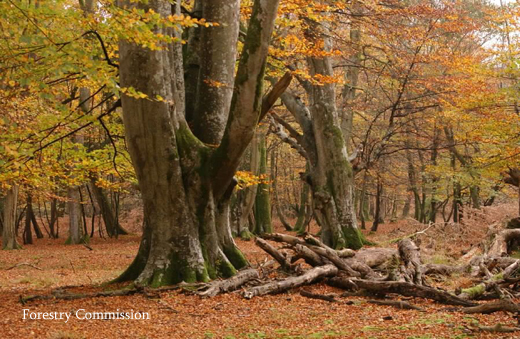UK: The great forest sale?
25.10.10
The largest shake-up of UK land ownership in recent times looms as plans to sell off more 150,000 hectares of woodland and forestry are drawn up by the government.
Despite surviving the recent Bonfire of the Quangos (Quasi Non Governmental Organistions) the Forestry Commission, the UK's largest land owner, faces the prospect of privately selling off much of its land in the massive shake-up.
UK woodlands were decimated for timber during the wars that clouded the early history of the 20th century but stocks have been replenishing ever since and many commentators believe there is now more tree coverage in the UK than at any time in hundreds of years. But of chief concern for many modern day treehuggers is the quality of the forest that could be sold and for what purpose.
Much of the re-planted forests since the end of the Second World War has been pine plantations. And although the Forestry Commission has been actively restoring many of these commercial plantations to more wildlife beneficial habitats in recent times they still provide important recreation venues so whether pine plantations are owned privately or publicly by the Forestry Commission is probably a moot point.

Of much more concern are the remnants of native broadleaf woodland as many of these tracts are under the control of the Forestry Commission (including Sherwood Forest, Forest of Dean, and New Forest). Mark Avery, Conservation Director of the RSPB, wrote on his blog yesterday: "Both the National Trust and the RSPB are quoted on this subject, and we both sound fairly relaxed about the principle but concerned about the detail."
This relaxed approach contrasts to the opinions of the UK's first Green party MP Caroline Lucas who told the Guardian: "If this means vast swathes of valuable forest being sold to private developers, it will be an unforgiveable act of environmental vandalism. Rather than asset stripping our natural heritage, government should be preserving public access to it, and fostering its role in combating climate change and enhancing biodiversity."
But Avery goes on to outlive his concerns in a bit more detail: "So the devil is in the detail, as always, as some FC land is of high commercial value, some of high nature conservation value, some of high value for both and some, probably, of low value for either. But land always has some value depending on its commercial potential, character and the constraints that apply to it. It may not only be foresters who cast an eye over our forests - housing and other commercial developers may see the land beneath the trees as being the value in any disposal plans."
With the first 150,000 hectares to be sold off within three years it won't be long before we understand the implications of this latest government money saving exercise.
Related links:
UK: "More tree planting" say scientists
26.11.09
 A panel of scientists met over the last two days to make recommendations for a giant tree planting scheme in the UK. The UK has only 12% tree coverage - a measly amount when compared with the rest of Europe (37%), Finland (74%), and North and Central America (33%).
A panel of scientists met over the last two days to make recommendations for a giant tree planting scheme in the UK. The UK has only 12% tree coverage - a measly amount when compared with the rest of Europe (37%), Finland (74%), and North and Central America (33%).
UK: Cutting down trees in the name of conservation
11.09.09
In an unusual twist of irony the Forestry Commission plan to fell 170,000 trees in the name of conservation.
UK: Britain’s forests reveal their secrets
08.09.09
 Britain’s woodlands have gone through a tumultuous past and now look set to become a vital part of the future. A new survey by the Forestry Commission of the estimated 2.75 million hectares (or 12 per cent of the land area) of woodland in Britain will form the most comprehensive record of them ever.
Britain’s woodlands have gone through a tumultuous past and now look set to become a vital part of the future. A new survey by the Forestry Commission of the estimated 2.75 million hectares (or 12 per cent of the land area) of woodland in Britain will form the most comprehensive record of them ever.